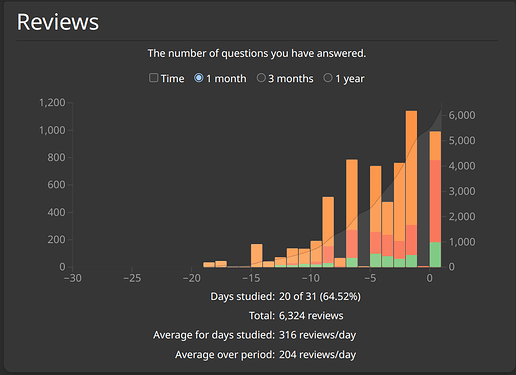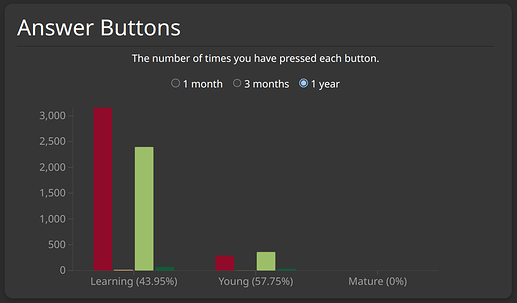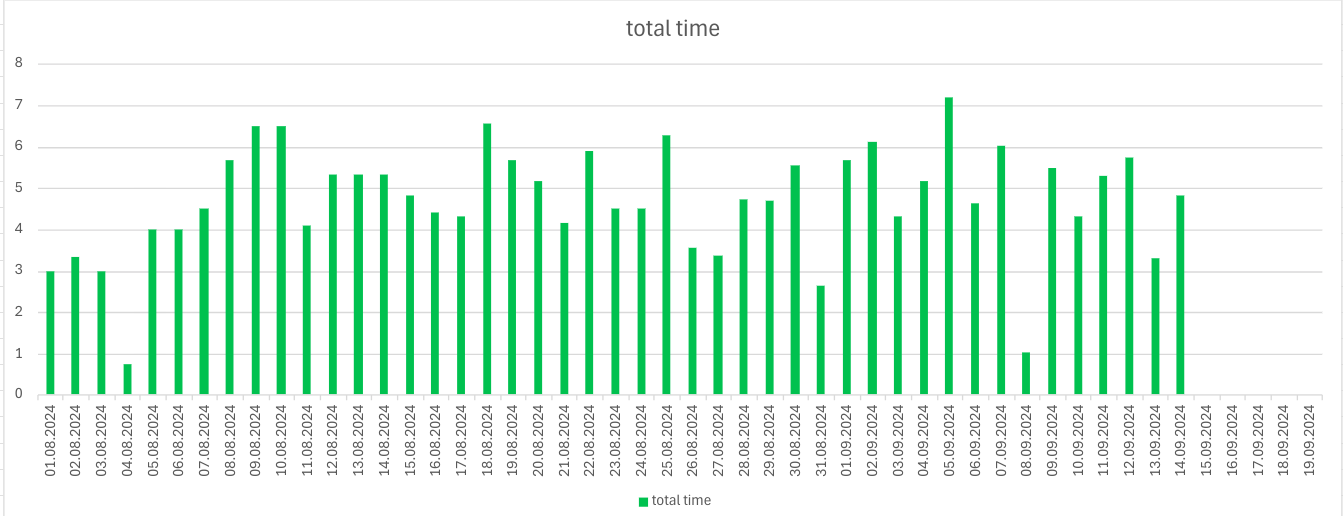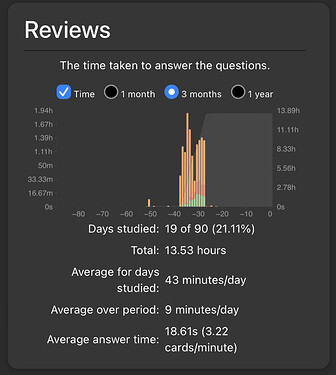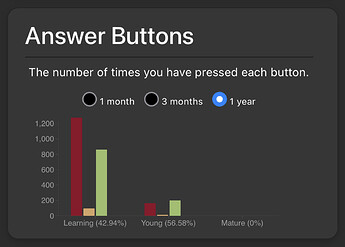In two months? Why not one month? The ultimate speed run.
One month? Let’s make it one week. True Gamer skillz
You’ll find out the answer when you reach N3
They may have not said 好き at all. Could have possibly been スゲー (kinda slang for すごい) as that sounds a lot more like what Japanese tourists might say when seeing something cool.
Oh, that could make sense!
It’s been 12 days since the last update so I think I should make a new one.
Grammar
Completed n5 and added 34 of n4 so far.
I have almost no ghosts for n5 grammar and can recognize it in texts.
Unfortunately in the past 10 days, I had an awful schedule (non at all) and was doing grammar from 1 am to 3 or 4 am. It’s quite inefficient so I got 84 ghosts -_-.
I’m thinking about restricting my time to 1.5 or 2 hours/day and to everything in the first half of the day.
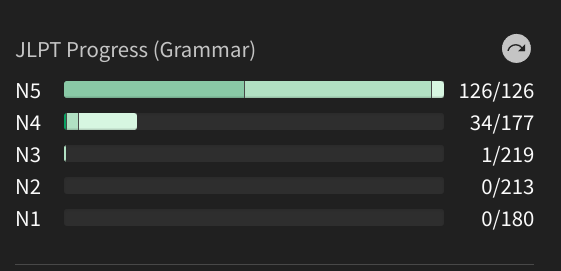
Kanji
Bad. I managed only to close reviews, but haven’t added anything. I think it’s because my schedule as well, but its so hard to sit and do them. Also now I have other stuff to do, and I guess it’s the problem as well. I should have completed them before moving on to the words I guess. Now it’s kind of opposite.
Words
Finally, I started learning words. I spent 10 hours on it in so far. Added 370 words so far, but around 150 took only about 1.5 hours because they were known or almost known. Going with tactic 5 seconds on a card, when a plugin fails it in 5 seconds (thanks @airbus29 for showing it). I’m getting really low 56% on young cards, but learning them of course easier. Still haven’t understood if this works (I was doing a lot cards with this method only 5 days) For example today it took 2 hours to do 180 reviews (I missed yesterday) and add only 13 cards (I want 30, but today I work for yesterday so it’s ok). It took me 1000 reps.
Anyway, I guess I should be consistent with this, and I hope I’ll add 1000 till the end of this month.
Input
I was doing around 40 minutes of reading/day on lingq.
I feel pretty good at reading basic-basic stuff.
Still have slow reading speed and missreading letters, but grammar is not a problem anymore compared to everything else.
I want to increase time to 1.5-2 hours because I think this is exactly what I’m missing to learn words faster and better.
Organization
I created an excel document to track my progress, time, etc.
For example here is the graph for total time spent:
Also, there are stats for kanji, words, grammar, reading, I think about including data about sleep and maybe a few other metrics.
So work in progress!
yeah the low retention is scary at first, if you feel its a little too fast, you can bump it up to 7-8 seconds (or however fast you feel you have enough time to answer). Its harder at the start though, since you have no prior grammar foundation to go on. I would say at the start you should maybe take a little slower until you get your footing beneath you. the beginning is the hardest part (at least for me so far), so once you get through right now it will always get easier.
I actually think about lowering it to 2 seconds to see what is going to happen)
Because when I was doing 15-18 seconds/card I had almost Identical retention for young cards.
Of course It was long ago, so I probably became better, but still -_-
I’ve been doing something similar to this (I don’t use Anki, so I can’t use this plugin) ever since I read your post, and while I was very disappointed in my correct percentage going down, I am getting through my reviews faster, and I think forcing myself to do this has actually increased my recognition because I’m a lot more confident now when the level increases. Before, if I remembered the word after 20-30 seconds, and it passed, I would wonder if I should demote it, but now I feel a lot better. It’s only been a few days but I’m really hoping this helps me. My vocab reviews are …a lot, lol, so decreasing the time I spend doing them will enable me to add more words and spend less time doing that and perhaps more time gaming.
On another note, I wrote a script that will measure how many minutes I spend doing Japanese per day in the hopes of understanding things a bit better. Today is the first full day (I wrote the script last night) but what I’m realising now is that there are certain periods of the day where I spend a lot more time doing cards than others (those are probably obvious, things like when I wake up in the morning, and lunch, so far, have been hot spots) so I’m wondering if I should try graphing this at some point. Of course, that would require a lot more effort than I might be willing to put into this lol.
Anyway, just wanted to say thank you for that suggestion.
Can you please explain how your script works?
Edit: Omg wrong script. I completely forgot I made that post about the new timer.
This one is just a simple timer that starts when I open any of my Japanese apps and counts up per minute and stops when I close the apps. That’s all. Sorry about the wrong script post. If I do reviews on my laptop, then I just open the app on my phone so it captures the time. 
It saves it to a variable every night and resets during my morning routine script.
Old version:
I write the words I’m learning in a notes app that I use every day, one line per word, it’s labeled by date. The script goes to various websites (forvo for words spoken by native speakers, tatoeba and immersion kit for sentences with audio, etc) and then uses jisho for basic definition stuff, and creates a many sided flash card with all of the things I want to be quizzed on. The words are added in reverse chronological order, so the most recent words come up next.
The script also does a bunch of not flashcard-related stuff, like I have a large database of Japanese vocab, kanji, and grammar, organised by JLPT Level that I found online, which automatically checks them off in the background as I learn them, so I can check progress every few months. Unfortunately, since I learn words conversationally, many of them are not JLPT words so they don’t count in the database 
no problem, doing it has saved me so much time overall and i think made me better at recognizing words quickly, so if i could pass it forwards thats good to hear
I’m so sorry, I forgot I made that previous post. I updated my post with the actual answer to the question you asked  . My apologies.
. My apologies.
I think spending 20-30 seconds on a card is a great idea. 5 seconds seems a bit too quick, especially if you want to comprehend sentences and maybe listen to audio, especially the non-AI audio.
It’s probably fine for simple sentences like お前はペンだ! Even for a single kanji like 敵 you should really think about the parts so it doesn’t just blur together with 適 摘 滴.
With a 5 second timer, you probably just gut guess “suitable”, reveal, then go “oh, it’s actually pluck. yeah I knew that, let’s mark it correct!” eventually once the ghosts and pressure starts piling up.
I think 5 second reviews is trying to solve the symptoms of the problem (too many reviews) instead of the cause (pacing too fast). Bunpro’s and other SRS take more than 6 months to fully load assuming you make only a few mistakes, so the review count is only going to get higher.
お前はペンだ
何???!!!
I was trying to go 15 sec/card and that approach just didn’t worked out. With 5 sec approach I can learn at least 30 words/2h (including all reviews) but with that one even 20 was a struggle and retention wasn’t better at all same 56% even though I was reading and listening all the sentences
So I just cut part with reading/listening to sentences, and part where I can not remember how to say the word for a long time (and click card anyways without remembering). I ether know how to read it from the start or don’t know at all.
It certainly depends on your goal, right? If your goal is to pass the JLPT, then 30 seconds is probably great, but if your goal is to have a conversation, 30 seconds is an insanely long, conversation-blocking delay.
So it should be up to the person, I think. I was spending probably 20-30 seconds per card before but this new plan (which isn’t actually seconds so much as the feeling of actual recognition vs struggling for the word) feels like it’s forcing me to actually learn the words at conversational speed.
So, I guess I’m saying I don’t think it’s only solving a symptom; it’s practicing quick retrieval, which is a known common issue for people speaking any language conversationally.
I’m personally going to try this out over time and see if this really makes me feel like I’ve mastered a card when it hits mastered, rather than constantly demoting my masters  .
.
I think 5 seconds / card is fine, and that’s what I do in anki. 20-30 secs / card is crazy long, since nobody thinks for that long trying to come up with a word while interacting with the language naturally. 5 secs/card also has the advantage of greatly increasing the number of cards you can do, which will help prevent burnout and increase your progress. I really don’t see much of an advantage for long cards since if you don’t remember it in 5 secs, maybe only 15% of the time you would remember it if you had 20 secs. Pausing to hear the audio for a sentence I also think is unnecessary, since in real life you’re going to need to be able to see and recognize a word even without much context in order to achieve true fluency.
I honestly have no idea how people can memorize and remember cards after interacting with them for 5 seconds once a week/month, assuming you’re not constantly encountering them elsewhere. 5 seconds would never work for me.

